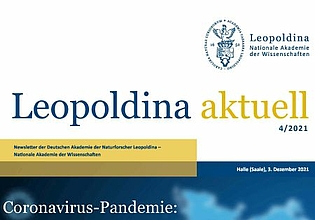News | Friday, 3 December 2021
New issue of the Leopoldina newsletter

Among other topics the new Leopoldina newsletter focuses on the 10th ad hoc statement on the coronavirus pandemic. Also of interest: Interview with Leopoldina members Helga Rübsamen-Schaeff and Ralf Bartenschlager on the development of antiviral substances against SARS-CoV-2, plus a guest article by Leopoldina Vice-President Regina Riphahn on a recent survey on the use of scientific expertise in the Bundestag.
The emergence of new virus variants - such as currently the Omikron variant –, which could be more infectious than previous ones, makes swift, consistent action even more a matter of urgency. In this context, the German National Academy of Sciences Leopoldina published its 10th ad hoc statement on the coronavirus pandemic. It is part of a series of ad hoc statements published by the German National Academy of Sciences Leropoldina over the last two years concerning the medical, psychological, social, ethical, legal, pedagogical, economic, public health and educational policy aspects of the pandemic. More on page 4
Published in November, the Leopoldina's ad hoc statement "Antiviral drugs against SARS-CoV-2" focused on pandemic control in the present and the future. In the new newsletter issue, the spokespersons of the corresponding working group, Helga Rübsamen-Schaeff and Ralf Bartenschlager, explain why the development of these drugs is so important, what they expect from policymakers and how industry and academia need to work together. More on pages 6 and 7
In Germany, there is not much data on how members of parliament use scientific expertise. Yet this information is important for the dialogue between science and politics. In a guest article, Leopoldina Vice President Regina Riphahn explains the results of a survey of members of the German Bundestag and their staff, which was commissioned under the banner of the Leopoldina Evidence Initiative. The aim is to make the importance of scientific evidence in the political decision-making process more transparent. More on page 12
